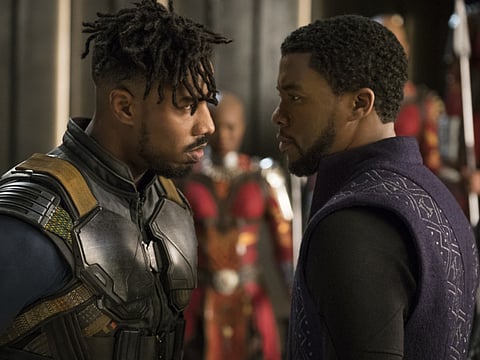‘Black Panther’ film review: A win for representation
The wait for a black-superhero-led film ends with Ryan Coogler’s triumphant ode to Afrofuturism

When Chadwick Boseman made his first appearance as Black Panther in Captain America: Civil War, a palpable energy was added to a superhero team that was already bursting at its seams. By the time the first trailer dropped for his standalone tent pole, that energy turned into a giant cannonball to the chest for those who have waited entire lifetimes to watch someone who looked like Boseman lead his own superhero movie.
Having watched the final product, we can say that the wait was worth it, even if unfairly delayed.
Director Ryan Coogler (Fruitvale Station, Creed) brings his distinct stamp to what could have been another cookie-cutter product from Disney’s superhero-churning mega-machine. Like Taika Waititi’s Thor: Ragnarok and James Mangold’s Logan, Coogler’s Black Panther is a testament to the power of director-led superhero movies, if only because we come away from it enriched and recharged, heartbroken but also uplifted.
There’s an added advantage that Coogler inhabits the world of his movie more personally than Waititi or Mangold could have ever hoped to in their respective superhero movies.
In Wakanda, the fictional African techtropolis that T’Challa (Boseman) hesitantly inherits after the death of his father in the events that unfolded in Civil War, Coogler fashions a haunting dreamscape; a land and society untouched by the ravages of colonialism, striving forever forward while still preserving its culture and heritage.
And it’s truly stunning to behold, like Sun Ra’s fever dreams, Black Panther’s Afrofuturism is unapologetically painted with colours of the elements and set against a thumping score by contemporary music’s reigning king, Kendrick Lamar. It’s the kind of art that’s aggressively theatrical, but not even for a moment does it feel performative. The fact that Coogler brought along his trusted colleagues from previous projects, including Fruitvale Station cinematographer Rachel Morrison, Creed production designer Hannah Beachler and his editing collaborator Michael Shawver, while also borrowing notes from the comic book’s latest writer Ta-Nehisi Coates, also helped create a more intimate and seamless setting.
The casting of Boseman as the Wakandan superhero couldn’t have been more perfect. The 41-year-old’s measured performance as the king with a tortured conscience is an acting masterclass in itself. And countering Boseman’s stately countenance is Michael B. Jordan’s street-slick Erik Killmonger, a troubled foe who threatens to tear the fabric of Wakandan independence and open it up to the outside world.
At the core of Black Panther’s beating heart is also its dazzling almost all-black cast, not least the women that make up a sizeable chunk. Although Boseman’s T’Challa/Black Panther leads, his power extends only as long as he’s supported by the women around him. Danai Gurira’s fierce warrior Okoye, Lupita Nyong’o’s soft-hearted spy Nakia, Angela Bassett’s regal Queen Mother Ramonda and Letita Wright’s precocious child prodigy Shuri; each of these women could and should have their own solo movies.
A cameo by This Is Us star Sterling K. Brown makes for one of the most heart-wrenching scenes in the movie. If there’s anyone who can squeeze a tear or two out of the audience, it has to be this man.
That said, the usual suspects of Marvel complaints have still stuck around. Superhero movie writers need to figure out how to up the game when it comes to their villains. Although Jordan does an impeccable job as Killmonger, and will perhaps inhabit our memories a little longer than Kurt Russel’s Ego (Guardians of the Galaxy 2) or Daniel Bruhl’s Zemo (Captain America: Civil War) or even James Spader’s Ultron (Avengers: Age of Ultron), Killmonger’s cold villainy would have worked better with more meat to his back story.
The film’s third act also fails to stand up to the tight storytelling and the emotional depth of the rest of Black Panther. Like almost every other movie in the MCU, save perhaps Thor: Ragnarok and the Guardians of the Galaxy films, Black Panther’s conflict resolution is way too abrupt and clunky to feel satisfactory, especially in the way it deals with (or doesn’t, to be more precise) Killmonger.
We’ll end with a reflection, however. At the end of the day, representation is a powerful force and more people need to see themselves in the content they spend their hard-earned money for. Hopefully, more studios and directors will grab onto the momentum that Black Panther will unquestionably create, and not let us wait another lifetime for a story like this.
Sign up for the Daily Briefing
Get the latest news and updates straight to your inbox


